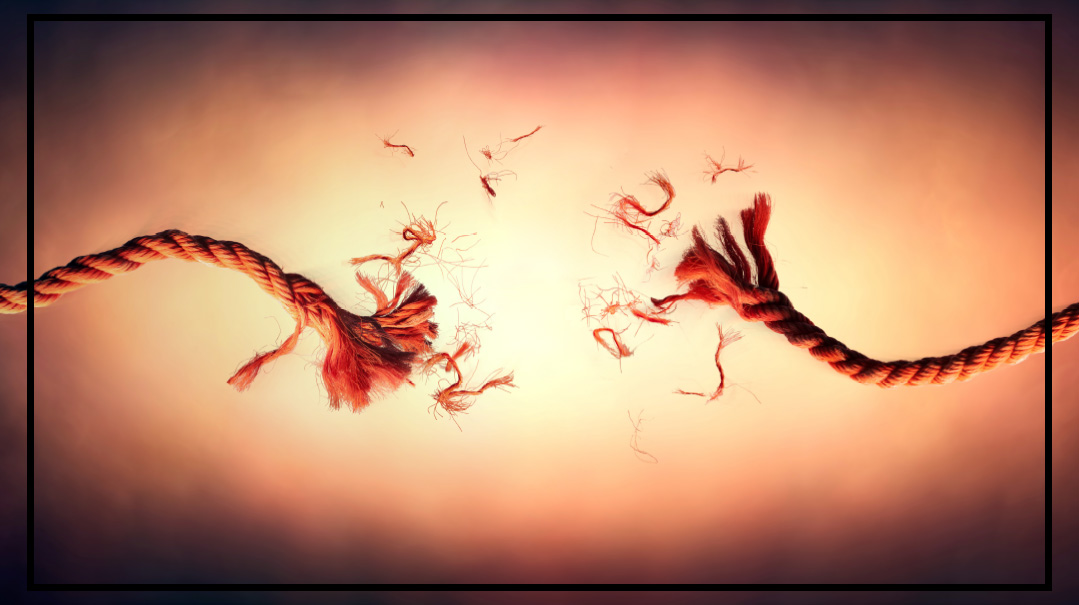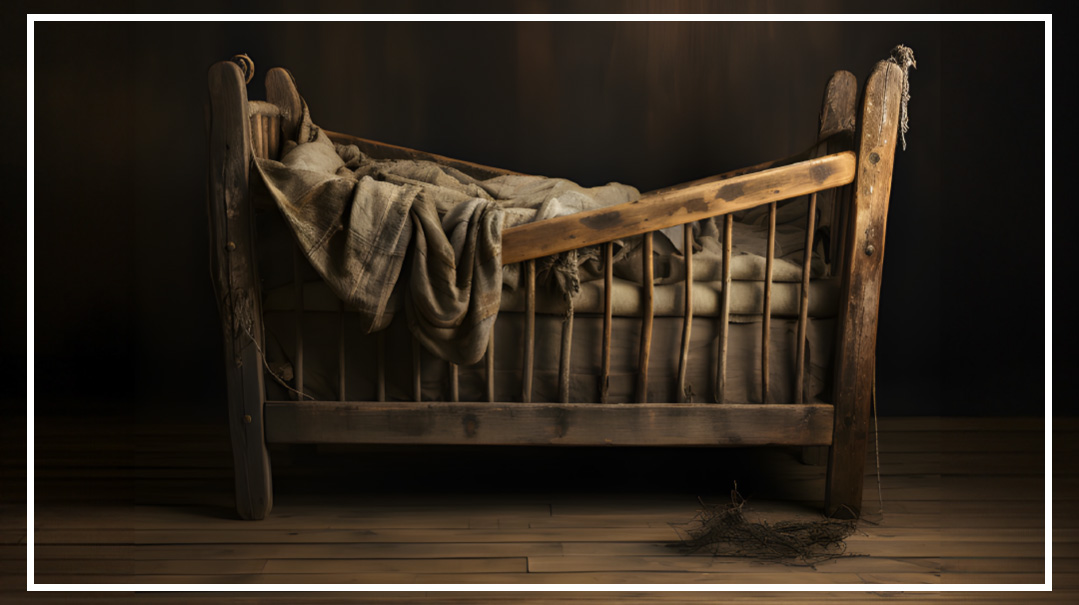Bulls and Bears
| September 26, 2023He didn’t want to work with this woman. But with another payment to Serenity Palms Recovery due next week, he could hardly afford to be choosy

11:30–2:30 Silver, session #3
Naftali always consulted with his daily planner, even though he never forgot his schedule. He liked seeing all the hours of the day neatly filled and accounted for.
At 11:28 a.m., he was in front of Mirna Silver’s semi-detached home. He dug out his keyring, quickly found the one labeled MS, unlocked the door and slipped inside. The musty scent of mothballs and aging filled the air, but he barely noticed it; it was the smell that had permeated his workdays for years.
He noted with satisfaction the neatly stacked, labeled boxes piled up against the far wall in the living room.
An easy job. The kids had been clear: We want the photo albums, her paintings, the seforim, and anything small with a value of more than $100. Everything else should go. Donate the furniture and dump the rest.
One more solid day’s work, and he should be done here.
He climbed the stairs to the second bedroom and methodically began emptying out every drawer. Most items were tossed in enormous, industrial-strength garbage bags he ordered in bulk, but every few minutes, he’d unearth something — a barely-worn quality leather belt, a well-kept hardcover book — that could enjoy a second life somewhere else.
Those items were carefully packed into his cardboard Goodwill box.
This was so different from the other job currently filling up his planner. Mike Carlson had also left only two children, Patricia and Emily, but they agreed on absolutely nothing.
Patricia was emotional and sentimental and felt like every item her parents had ever purchased should be preserved for eternity. But she lived in a small apartment down in Boca and had no room for any of it. So she wanted it all shipped to Emily.
Emily, who owned a sprawling ranch in Nebraska, had no interest in anything her parents had owned.
“Look,” she’d told Naftali yesterday, as he tried to broker peace for the sixth time, “my parents were good people and all —” he braced himself for the “but,” for the pain and recriminations he knew were about to emerge, “— but they never really got me, you know what I mean?
“I married Bob, we moved far, far away, made a good life for ourselves.
“I’m sorry Dad’s gone, although he had a good run of it, he was 89 you know, and now it’s time to move on. Toss everything.
“I don’t want no mementos,” her voice dripped scorn as she used her sister’s favorite word, “over and out is what I say.”
He was going to call Patricia today and give her his ultimatum: Either she and her sister come to an agreement, or he’d have to let go of the job, and she’d lose her deposit. He hated putting his foot down, but he also couldn’t keep blocking off time for a job with no clear marching orders.
But he didn’t have to do that just yet. Right now, he could enjoy the sense of peace and order he got every time he emptied out a home that no longer had an owner.
Gray slacks, toss. Black sweater, toss. Mother of pearl brooch, donate. Or maybe Mirna’s daughter would want it?
He thought of his two girls, their homes filled with the items Chavi had used, worn, loved.
In Hadassah’s home, those items were cherished and enjoyed. In Raizy’s home, there was a sense of desperate clinging; she’d wrap herself in the colorful scarves Chavi had favored, swaddle herself in the soft pink throw that had once been a permanent fixture on the couch in his home.
Sometimes Naftali felt like gently prying off the throw, of telling her “Zeeskeit, she’s gone. We can’t mourn her forever. It’s time to move on.” But he and his children didn’t have such conversations.
Now, in Mirna Silver’s comfortable, old-fashioned home, he consulted his notes. There was no check next to jewelry. Some people knew that memories are meant to be tucked away, not scattered through every corner of your home.
He slipped the brooch into bubble wrap and added it to the Donate box, tossed a music box that probably hadn’t played music in decades, then wiped down the last empty drawer.
Tomorrow Derrick from Twice as Nice would pick up all the furniture at twelve p.m., the shipping company would arrive between nine and eleven to get the paintings and sefarim, and he’d do a Goodwill run.
By afternoon, the cleaning company would be giving the house a thorough scrub. Then it would be ready to be put on the market, ready for some other couple to buy it, to love it, to fill it with the happiness and messiness of their lives, with the things they cherished and the things they didn’t even know they owned.
They would make their mark upon it, until one day, they, too, would vanish into the great unknown of life after death.
He shook himself. Too much philosophy. There was one last bedroom to go through, and it was always easier to sort in daylight. He had to keep moving.
His phone buzzed. Had Patricia preempted him?
He glanced down and a vise tightened around his heart.
Serenity Palms Recovery.
“Hello?” it was a panicked question more than a greeting.
Eric must have heard what he hadn’t said.
“Everything is fine, Mr. Altman. Jake is okay now.”
“Now?”
“Well, we had a little… incident yesterday.”
The vise tightened, squeezing his heart hard, hard, hard.
“Jake got into an altercation with another resident. It got violent.” A pause. “Jake still harbors a great deal of rage.” Another, longer pause.
Anger spurted through his own veins. What was wrong with the boy? Why couldn’t Yanky ever toe the line? He was in rehab, the expectations were lower than the floor — could he not even behave there?
“Both Jake and the other guy were badly bruised, but thankfully, it wasn’t anything more serious than that,” Eric continued.
“But this is a serious infraction. We’ve revoked certain privileges, and we definitely don’t feel like Jake is anywhere near ready for discharge.”
The pause this time stretched and stretched. Clearly, he was meant to respond.
“Well… uh… I appreciate you letting me know,” he finally said.
“Of course. Heather — she’s his primary therapist — and I do feel that he may soon be ready to include family members in his therapy sessions.”
This time, there was no pause. “There’s no need for that. Yan — I mean Jake — is an adult, he’s twenty-one years old. He doesn’t need me to fly down to Florida so we can talk.”
“It is quite a distance for you from New York,” Eric said smoothly. “While in-person is always best, we’ve found that even a Zoom call can be extremely effective.”
He needed to end this call.
“Look, I know this is important — I’m spending $15,000 I don’t have on Jake’s treatment each month. But this is something he needs to work out on his own. It has nothing to do with me.”
“Mr. Altman, we’re all part of a system, and our family of origin impacts us powerfully. When—”
An unfamiliar number flashed across his screen.
“Eric, I’m sorry, but I’m getting an important call. Let’s talk later.” And with a wave of relief, he finished the call.
* * *
Five hours later, as he drove home after Minchah and Maariv and a quick grocery run for frozen potato knishes and canned soup, that same number flashed across his screen.
This time, he picked up.
“Is this Final Farewell?” the woman on the line spoke in the clipped, hurried tones of someone with no time to waste.
“Yes.”
“I heard you’re efficient and trustworthy, and that’s what I need. My father died two days ago—”
“I’m so sorry.” The words always sounded hollow.
“I’m not. It was time. He was starting to lose it. And he always said he’d rather be dead than senile.”
He winced at her tone. She plowed on.
“He was a bit of a hoarder, and his house is packed. And, lucky me, I’m the only child.” A brittle laugh. “I need someone to go through it and get rid of the stuff. How much do you charge?”
“Well, I have to see the property first, and hear if you want me to simply dispose of everything, or if there’s any sorting involved. I’d need—”
“Okay, fine! So be here tomorrow at 3. The house is at 4836 Elm Ridge.” And she hung up before he could even check his calendar.
He sighed. He didn’t want to work with this woman. But with another payment to Serenity Palms Recovery due next week, he could hardly afford to be choosy.
* * *
The house at 4836 Elm Ridge was a large colonial painted navy with white trim. The color was fresh, the hedges trimmed. This home had been owned by someone who looked after it.
The woman — she introduced herself as Lydia Norman — showed up right on time. Her car was expensive, and she spoke in the manner of someone accustomed to giving orders.
“Here’s the deal,” she said before he could say a word. “I have no time for any of this. But my son Zack was named after Dad’s father.” Her voice dropped to a whisper. “His name was actually Zelig, but there was no way I was using that name. Zack was close enough to make Dad happy.
“In any case, Zack is taking genealogy in college and he’s become obsessed with his roots,” she mimed elaborate air quotes around the word roots, “and now he wants to find out everything he can about his great-grandfather.
“Dad never, and I mean never, spoke about his family, so I have no idea if there’s anything about them in this house, but I do need you to go through all the documents and pictures. Which I assume will slow everything down.” She sighed.
“Here’s the key. I was told I could trust you. Take a look around, figure out how long it will take you to do your usual clearing and to also sort through all documents and photos, and then give me a quote tonight.”
He still hadn’t said a single word, and she was gone. He was left on the wraparound porch, the key on the railing.
He took the key, carefully labeled it, then slid it into the lock.
The house was clean and orderly.
The death must have been sudden — there was a bowl of fruit on the kitchen table just starting to spoil, a few fruit flies buzzing around it; there were yogurts in the fridge with expiry dates a week away, and in the laundry room, there was a load in the washing machine.
Naftali moved methodically through the rooms, opening closets and drawers, jotting notes in his organizer.
In the study, tucked into the bottom drawer of the desk, wrapped in a strong rubber band, he found a pile of letters.
He eased himself onto the well-padded, brown leather chair, gently pulled the rubber band off the pile and lifted the first letter. It was an aerogram, thin paper. In the upper right-hand corner, the postage was British, showing an image of King George VI, and the postmark was Palestine, September 9, 1946.
Naftali’s hand’s trembled slightly as he opened the aerogram. He’d been doing this for nearly two decades, and yet he was still awed every time he realized he was touching a piece of history.
The missive was in Yiddish, scrawled tightly over every inch of the page.
Hershel, my yingele,
It took me a long time to find out where you were. You just disappeared. We were so afraid.
Then Aunt Sarah got a letter from her Yossele who went to America to try to make his fortune. And he told Auntie Sarah that he’d seen you, that you were living on the Lower East Side.
He didn’t know your address, but he told her I could write to him, and he’d get this to you. I daven that you’ll see this.
I miss you, Hershel. I know that you and Tatte didn’t always agree on things, but why did you have to run away? And why America? They say that most of the Yidden there become goyim. Hershel, don’t let that happen!
Here, we’re getting ready for the Yamim Noraim. Tatte is practicing the niggunim, and Medlowitz from upstairs is practicing his shofar blowing so it feels like Rosh Hashanah every day.
The letter continued with a potpourri of family news and gentle chiding. As soon as he finished the first letter, Naftali reached for the second, dated Oct. 29, 1946.
Hershel, my yingele,
Yossele told us that you’re finding your way. He said you work as a shoeshine, and you polish all the rich men’s shoes, and sometimes you also run errands for them.
Hershel, I never worried about how you’d find food; you’re so smart and always managed to find your way. But Hershel, what of everything else? Where are you living? Where do you have your Shabbos seudos? Is there a shul nearby?
The Yamim Tovim here were beautiful. Tatte’s tefillos uplifted all of us, and on Succos, Aunt Sarah sent her boys to sleep in our succah since theirs is so tiny. We…
A detailed account of how this family in Eretz Yisrael had spent Tishrei followed.
The letter ended with a plea:
Please respond. Tell your mother, who loves you so, so much, how you are feeling and what you’re doing.
Naftali put down the aerogram gently. He needed to finish his estimate. He returned the letters to their bottom drawer and moved to the staircase leading to the basement.
An hour later, he had a basic list of the contents of the home. He dialed Lydia Norman’s number.
“You’re fast,” she said instead of hello. “Good.”
He gave her a description of what had to happen in the house, then named his price.
“Fine,” she said. “Do it.”
“One more thing. I found a large bundle of letters in the study. They’re written in Yiddish. They’re correspondence between a woman named Fraida Bergenfeld in Eretz — I mean British Mandate Palestine — and her son, who was named Hershel. Was that your father?”
“Well, his name was Harry, Harry Berg. And he did grow up in Palestine — that much I do know — so it makes sense. Zack will be happy.” A pause. “So you can translate the letters?”
“Me? I’m not a translator. Perhaps I can recommend—”
“Do you speak Yiddish?” she said impatiently.
“Well, yes, but that doesn’t mean—”
“So just do it. I can’t start hiring another person now. How much more do you want?”
He thought about the bill that had arrived that morning. He thought about Hershel, another rebellious son. He quoted a price.
There was a sharp intake of breath, then a grudging, “Fine.”
* * *
Hadassah’s Shabbos table looked so much like Chavi’s had looked.
Maybe it was the fact that she used Chavi’s Shabbos china, the beautiful Wedgewood with its timeless cream and gold pattern.
Maybe it was because she made so many of the same dishes Chavi had loved.
Or maybe it was because she looked like Chavi and shared so many of her mannerisms.
Every time he came here for a Shabbos meal, there’d be a fleeting moment when he’d see Hadassah, and his heart would lurch at the sight of Chavi. And then his brain would kick in and remind him that his wife died of cancer six years before, and he would never see her again.
This week it happened as Hadassah was serving the poached salmon that Chavi had made each week. It took a moment for him to regain his equilibrium, so he nearly missed the glance between Hadassah and her husband.
He’d been married long enough to know that look; it was wife-speak for now is when I want you to bring up that issue we discussed.
Sure enough, after a perfunctory bite of salmon, Meshulem took a long drink of seltzer — a strawberry-kiwi flavored seltzer that made Naftali cringe — Hadassah wasn’t like her mother in every aspect — and then turned to him.
“We had a long talk with Yanky last night,” he said. “Hadassah called him. He didn’t sound so good. It’s… it’s hard for him.
“His therapists feel it’s very important for him to be in touch with his family, to feel loved and supported.”
Meshulem took another sip of seltzer, then looked him in eye.
“He wants to have Zoom sessions with you. He wants — needs — to talk with you.
“For so long he wouldn’t talk to any of us. Now he’s asking for connection. Hadassah speaks to him every week. But he needs a parent.”
Naftali turned away, focused on little Chavala in her high chair. She was tossing pieces of salmon onto the floor.
“I can’t do it,” he said finally.
“But why?” Meshulem said, “He’s a good kid….”
Natali never lost his temper. But that didn’t mean he didn’t get upset. His kids knew that the softer he spoke, the more upset he was.
His voice was very soft when he responded. “Good kids aren’t drug addicts.”
Meshulem flinched.
Hadassah stepped in. “Tatty, he’s not a drug addict. I mean… he’s addicted to drugs, but that’s not who he is. He used drugs because he was in pain. He’s still in pain.”
“And you’re not in pain?” Naftali burst out. “But you don’t get tangled up with dangerous drug dealers.
“You didn’t steal from your father and sell your mother’s jewelry, the jewelry that was supposed to be given to your future wife, to buy more drugs.
“Life is hard. You move on. You do what you’re supposed to do.”
A kaleidoscope of emotions flitted across Hadassah’s face. She opened her mouth, then closed it.
“Oy, I forgot to put out the chrein,” she said finally, and she hurried to the kitchen.
The wrong parent died, Naftali thought as he watched her retreating back.
* * *
Postmark: December 23, 1946
A frielichen Chanukah, Hershel, and a git chodesh.
I know Chanukah will be long over by the time you receive this letter, but that’s what my heart wants to tell you right now.
There’s a space in the box outside where we light our menorahs where your menorah used to stand. Moishe asked if he could use your menorah, but Tatte said no. He’s saving it for you, Hershel. He waits for you to come home.
Yossele told me that you’re doing well in your job, that the man you work for said you’re smart as a whip, and you’ll go far. And he’s starting to pay you a salary beyond room and board.
I’m glad your body is cared for. But Hershel, what about your neshamah?
The letters were all similar. A mother’s love. A father’s silence. Family news. Aching hearts.
Naftali settled into a routine.
In the morning, he cleared the rooms in Harry Berg’s house, dismantling a lifetime of possessions. In the afternoon, he sat on the brown leather chair in the study, and he uncovered Hershel Bergenfeld’s past.
Harry Berg had done well for himself in the goldeneh medineh.
From the degrees on the wall — the ones Lydia had told him to toss — Naftali learned that Harry had attended college, and gotten a BA in Economics from City College of New York in 1957, and an MBA in 1962.
He must have become a stockbroker; there were Series 7 and Series 63 Licenses hanging prominently on the study wall, as well as a 1979 Broker of the Year award from The Wall Street Journal and awards of recognition from Goldman Sachs for his “unwavering dedication, bull-like tenacity, and outstanding achievements in the field of investment trading.”
Naftali placed each of the framed awards in a garbage bag slowly, gently. Throwing out what another man had labored a lifetime to achieve.
Postmark: February 3, 1947
Hershel, my yingele,
Chaya Bruchy is starting shidduchim. I never dreamed we’d be going to Gittel the shadchante for her before you, our bechor, would be married.
I was sure that by now, you’d living in a little room off a courtyard near ours. Instead, you’re in some big house in New York.
Do they treat you well? Are you happy?
Postmark: March 13, 1947
Chaya Bruchy is a kallah! The chassan is Shulem Malinsky, the son of the tailor. Do you remember him? His brother, Ahron Duvid, was in your class in cheder.
The chasunah will be after Succos iy”H. We are all busy sewing her trousseau.
Hershel, I miss you. Please respond. Please tell me how you’re doing.
The little bits of news we get from Yossele are like salt water; they just make me thirsty for more.
I know you’re angry, Hershel.
Please understand that Tatte loves you so much. But even more, he loves Hashem and the Torah.
And when he saw you leaving the path of everything good, it was like watching you walk toward a landmine. He felt he had to do anything he could to save you.
He didn’t want to chase you away….
Harry Berg was a study in contrasts. He had been methodical and organized; his spices were alphabetized, and his shirts hung by sleeve length, then color. His Persian rug was in the exact center of his sitting room.
But he had a wild streak. In the dining room, he had a vintage brass bar cart, with an array of exotic liqueurs. He had neckties in every color of the rainbow, and a dazzling array of bowties. There was a teal feather in the fedora on the top shelf of his closet. And the art in his home was bold and disturbing.
Naftali tried to move through the home quickly; Mike Carlson’s daughters had finally come to an agreement, and his house was waiting to be emptied. But this job was taking far longer than usual.
The letters he painstakingly translated each afternoon slowed down his morning work. This wasn’t the possessions of a stranger; it was the detritus of Hershel’s life.
* * *
On his fifth day on the job, he arrived home to find a letter in his own mailbox. It had a Miami postmark and was sent two days earlier from Serenity Palms Recovery.
He put it gingerly on the kitchen table.
He left to daven, came home, and prepared a simple meal. Ate it.
Then he picked up the letter and slit open the envelope. There were two pages inside, written in his son’s nearly illegible scrawl.
He put on his reading glasses, held the paper close to his eyes, and read.
Dear Tatty,
I’m writing this letter during my session with my therapist Heather. She’s helping me find the words to express what I’m feeling. To say what I need to say so it doesn’t get stuffed down and rot inside of me.
Tatty, you know that I always had a special relationship with Mommy. I was her baby, her only son.
And she was my mother bear, the woman who would love me and defend me and protect me no matter what.
When I got in trouble in school, she was in the principal’s office half an hour later, trying to help me clean up the mess I’d made.
When I got caught shoplifting, she was down there in the police station. Not letting me off the hook — she was big on personal responsibility — but making sure I didn’t have to face the music alone.
She believed in me even when I didn’t believe in myself.
Then she got sick. And we had to watch her slide away from us, one horrible day at a time, until she was gone.
Hadassah and Raizy clung to each other. You went into your shell. And I was left alone.
Naftali put down the letter. Went to the kitchen and made himself a cup of black tea. No sugar. He took a scalding sip.
Then he kept reading.
The hole inside me got bigger and bigger.
I tried to stuff it with all kinds of things, things that felt good for a day, for an hour, but left me even emptier.
I want to change. To find healthy ways to fill the hole. Or maybe find a way to live with the hole and still be okay. I’m working on that here.
And you’re working so hard to pay for this rehab. I know that and I appreciate it.
But I need more.
We’ve been out of sync for a long time, Tatty. Can we find a way to fix that? I’m trying to be better, to do better. But I need you on my team.
Can we talk, you and me? Really talk?
Jake
Naftali sat there a long time, right hand clutching his son’s letter, left hand curled around a cup of cooling tea.
Then he stood up, dumped the tea in the sink, tucked the letter behind the unpaid bills, and went upstairs.
Postmark: May 1, 1947
Hershel, my Hershel,
Pesach was beautiful. We had the chassan for one of the seudos, while Chaya Bruchy went to his family. She’s becoming close to his sisters — there are eight of them, and Chaya Bruchy loves spending time with them.
Where were you for Yom Tov? Were you able to get matzos?
Yossele says that in New York you can get plenty of kosher food. But you have to want to get it.
The weeks after Pesach were terrible.
Remember the Levinsteins? Yisroel and Menashe joined the Irgun.
Things have been heating up here for a while. The British have been passing more and more laws, and life has become crushing.
The Levinstein boys were given a mission to blow up a British arms depot just outside the city.
It was such a shtus; there was no way they could have succeeded. And they didn’t.
They were caught, taken to Acco and imprisoned there for a few days. Three days ago, they were hanged.
They were “lucky” — at least the British returned their bodies.
The courtyard was filled with Shifra Levinstein’s sobs ever since she heard of the capture. But at the levayah, she went silent and hasn’t said a word since.
I think about you when these things happen. And I wonder if you would have been able to withstand the allure of these dangerous groups.
Might I have lost you had you stayed? Is it a blessing in disguise that you’re so far away, in a land that’s safe? But then I worry for your soul, which lasts forever, and I have no answers, just questions that fill my sleepless nights.
Hershel, please give me answers. Let me know that you are safe in both body and soul.
Harry kept his clothing in immaculate condition; the women at Goodwill would be happy.
There was a mountain of linen and towels in pristine condition. A basement stocked with food staples that would make a nice donation to a food pantry.
Naftali winced at the sight of canned luncheon meat, no hechsher in sight. Did Fraida Bergenfeld ever discover the truth?
Postmark: July 21, 1947
Hershel, my yingele,
The heat is oppressive. It is fitting that these are the Nine Days for we are mourning again. We mourn all the time.
More boys were hanged last week. One was Reuven Alter, who lived across the street. He left an almanah and two tiny children.
And then there’s typhoid. It’s everywhere, like the Malach haMaves is dancing through the streets.
Little Ruchele has been running a fever, and I’m afraid, so afraid.
We have no money for medicine, no money for food.
Hershel, I miss you so much. But I’m happy that at least one of my children has enough food to eat every day.
Postmark: September 18, 1947
Hershel!
When Aunt Sarah brought the envelope to me yesterday, and I saw your handwriting, I nearly snatched it out of her hands.
Finally! I was so thirsty to hear from you.
Aunt Sarah kindly left immediately so I could open it up.
And the bills fell out.
So much money! This will buy us enough food for all of Tishrei, and even for the chasunah seudah. It will get medicine for Ruchele — she is weak and sickly after the typhoid. It will even allow the little ones to get new shoes, and they need them so badly.
Thank you a hundred times, Hershel, for your generosity.
But my zeeskeit. There was no letter.
My child, do you not know that much as the money will help us in so many ways, what I want, more than anything in the world, is you?
He’d finished the basement and most of the upstairs bedroom.
Today he was going through the extensive library. There were hundreds of books.
“Are you sure you don’t want any of these?” he’d asked Lydia in their daily check-in last night.
“I assume you’ve heard of Kindle,” she answered. “I can fit his entire library in my purse. Dump them. Or donate them if you want to do your good deed for the day.”
He glanced down at the titles as he packed up the books for the local library. “Closing Bell to Open Wallet: The Daily Life of a Wall Street Trader” by Harry Berg. Goodness, this man had not only been successful professionally, he’d also found time to write books.
Naftali flipped the book open and glanced at the dedication. To Mark Glassman. He took a scrappy immigrant into his home and sent him back to the world as an accomplished college graduate. I’m grateful.
There were more books penned by Harry.
“Down but Not Out: Triumphing Over Adversity in the Bear Market Era” also had a dedication: To the only woman who loved me always and forever. Mama, I left you, you left me, but what you gave me in the few years we had together formed the foundation of everything I ever built.
There was one more: “Principles of Bull Market Prosperity: Strategic Pathways to Wealth.” Naftali opened it slowly. Would this one be dedicated to his wife? His daughter?
To my father. A man of principles.
He put the three books aside.
Then he packed up the room shelf by shelf, bookcase by bookcase, working on automatic until the room was swathed in darkness. He flipped on the light, taped the last box, and let himself out of the house.
Postmark: October 22, 1947
Hershel, my yingele,
The chasunah was wonderful.
They say there is no nachas like marrying off a child. Now I know that they are right.
The only thing that kept the night from being perfect was that you were missing.
We were in the middle of sheva brachos when an Arab tossed a grenade into the courtyard. It was terrifying. There was an enormous explosion, breaking glass, screaming.
B’chasdei Hashem, no one was killed. One little boy got shrapnel in his leg and needed surgery, but Dr. Wallach says he will recover.
Most of us lost our windows; the glazier will have plenty of work this month.
Hershel, what is your life like? Yossele says the man you work for likes you and wants to give you an education.
Learning is good, it takes you on a path. But Hershel, you need to see where that path is leading….
Postmark: January 21, 1948
Hershel, my zeeskeit,
Aunt Sarah brought me another envelope from you.
The money you sent is helping us survive. And we’re so grateful.
But I will never stop longing for a letter. My son! How are you? What is your life like?
Grow like a tree. But please, never forget your roots.
The clearing process matched the dwindling pile of letters.
He’d emptied the second floor, exhumed everything from the attic. The kitchen was bare, the living room echoing with emptiness.
The local library had already picked up all the books. Tomorrow would be the furniture pickup, he’d do the Goodwill run, and he’d meet Lydia and give her two boxes of mementos he couldn’t bear to toss.
Then he’d email her son the file with all the translated letters.
There was just one letter left in the pile.
It was different from all the others.
It wasn’t an aerogram; it was a piece of writing paper in a large envelope. The stamps on it no longer featured a British monarch; there was a menorah, and in proud Hebrew letters it announced that it was from “doar ivri.”
The postmark was June 23, 1948.
Naftali looked at the letter for a long time, dread in the pit of his stomach.
He took a deep breath and unfolded the letter.
Dear Hershel,
I’m so sorry to have to inform you that your parents are no longer alive.
Your mother died of typhus before the war even broke out. There was so little food, and the conditions were terrible.
Your sister Ruchele got sick again, and this time, your mother caught it, too.
They are both buried on Har Hazeisim.
Your mother has been my best friend since the day she married my brother. You don’t need me to tell you what a tzadeikes she was, the chesed she did with everyone she met. Such a loss!
Your father was killed during the first week of the war. A Jordanian sniper shot him when he was walking to shul.
Moishe, Chana, and Dinala are all living with us.
Say Kaddish for your parents, Hershel. They both loved you so much.
Aunt Sarah
Naftali sat in the brown leather chair, immobile.
He read the letter again.
And again.
There was a guttural scream, the keening sound of sorrow too great to bear.
It had emerged from his mouth.
Another howl clawed out of him, a tsunami of grief and horror and pain.
Hershel, his mother, his father, Ruchele.
Chavi. His Chavi.
Yanky, Yanky, Yanky.
Naftali Altman, the man who had remained composed at his own wife’s levayah, the man who could always control his emotions, was unraveling. His body gave way, and he slid off the chair to the floor.
Searing grief ripped through him.
He howled, raging against a world that had snatched away what was most precious, against missed opportunities, ruptured relationships, and love that was as strong as a fortress — and just as impenetrable.
Ragged sobs erupted forth until he was sure he would not survive the pain.
Later — was it minutes or hours? — when the crying had finally abated, when the raging pain lessened its grip on his heart, he staggered to his feet.
He pulled the rubber band over the bundle of letters and placed them gingerly on top of Lydia’s box.
He walked through each room, checked each closet and drawer.
Empty, empty, empty.
Just like him.
Then he locked the door and drove home.
* * *
He met Lydia Norman in front of 4836 Elm Ridge early the next morning for the final handover and payment.
Derrick from Twice as Nice had already done his pickup.
The Goodwill boxes were packed in his car.
They were next to a suitcase.
He had a two forty-five p.m. flight to Miami he needed to catch.
(Originally featured in Mishpacha, Issue 980)
Oops! We could not locate your form.







